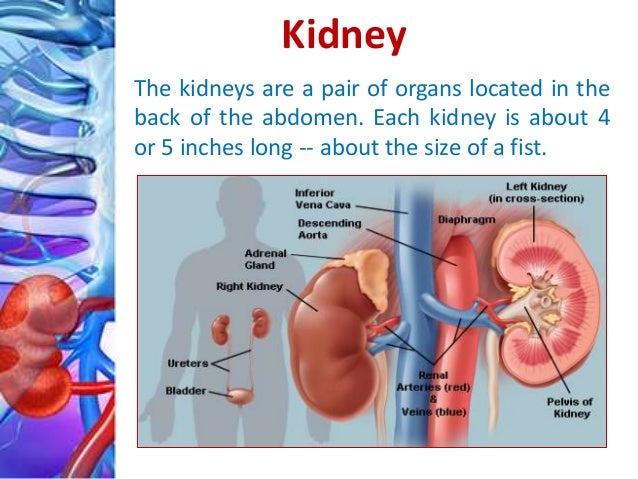What are the long term effects of donating a kidney?
The evaluation process ensures that you are healthy enough to donate a kidney. The Surgery . The more you learn about your surgery, the better choices you can make about your health. Things to consider . Find out what questions to ask yourself as you go through your decision-making process. After donation ...
What is the recovery time after donating a kidney?
Over 6,000 people donate their kidney every year and over 100,000 people are in need of a kidney transplant each year. If there is someone in your life who needs a kidney, there are multiple ways to proceed. You can help them by becoming a living donor, but if you are not able to donate or donating is not the path for you, there are other ways to help.
What are the risks of donating a kidney?
A kidney transplant is done when a patient is undergoing kidney failure and will soon lose complete kidney function. 85% of patients waiting for an organ transplant in the US usually wait for a kidney. On average, it takes 3 to 5 years to receive a kidney from a deceased donor, and live donations are even harder to match. Considering the grim reality, kidney patients waiting for a …
What are the pros and cons of donating a kidney?

What are side effects of donating a kidney?
Risks and Benefits of Living Kidney DonationPain.Infection (such as pneumonia or wound infection)Blood clot.Reaction to anesthesia.Death (Worldwide mortality rate for living kidney donors is 0.03% to 0.06%)Conversion to open nephrectomy.Need for re-operation (such as for bleeding)Re-admission to hospital.More items...
Does donating a kidney shorten your life?
Living donation does not change life expectancy, and does not appear to increase the risk of kidney failure. In general, most people with a single normal kidney have few or no problems; however, you should always talk to your transplant team about the risks involved in donation.
How serious is donating a kidney?
Kidney donation involves major surgery and there are risks, including bleeding and infection. But the overwhelming majority of kidney donors recover with minimal complications. After your kidney is removed (nephrectomy), you'll usually stay only overnight in the hospital and complete your recovery at home.
What do you lose when you donate a kidney?
If you are thinking about donating a kidney, you should know that: On average, you will permanently lose 25-35% of your kidney function after donating. Your risk of having kidney failure later in your life is not any higher that it is for someone in the general population of a similar age, sex or race.
What is the best age to donate a kidney?
18 years or olderTo donate a kidney, you must be in good physical and mental health.As a general rule, you should be 18 years or older.
Who pays if you donate a kidney?
Who pays for living donation? Generally, the recipient's Medicare or private health insurance will pay for the following for the donor (if the donation is to a family member or friend).
How painful is donating a kidney?
How much will it hurt? Everyone is different, but you could be in a lot of pain after the surgery. But it will get easier each day, and there are different types of pain relievers to make you feel better. Shortly after surgery, as your anesthesia wears off, you'll get pain medication through an IV into a vein.Nov 19, 2020
Can I drink alcohol with one kidney?
Alcohol affects all of your body's organs. However, the effects of alcohol on one kidney lead to multiple issues. Although drinking one to two drinks a day typically won't be an issue, if you have one kidney, it will. When you drink, you will generally urinate more.Oct 16, 2020
Do kidney donors gain weight?
Overall, among all donors, weight increased significantly following kidney donation from 79.5 ± 2.5 kg to 81.8 ± 2.7 kg at last follow-up (mean difference 2.3 ± 0.9 kg, P < . 0001) (Table 2).May 7, 2019
Can I drink if I donate a kidney?
Yes, kidney donors can eventually drink 1-2 alcoholic drinks but should abstain in the weeks following the transplant. Women and those over 65 should stick to 1 alcoholic beverage per day at most, while men should have no more than 2 drinks in a day.Nov 13, 2020
Can a woman donate a kidney to a man?
Our results suggested gender matching for kidney transplant. Only in some exceptional conditions, male donor to female recipient kidney transplant may be successful and female donors to male recipients are not suggested, especially in aged patients with the history of dialysis.Jan 6, 2020
Is donating a kidney major surgery?
For the kidney recipient, the risk of transplant surgery is usually low because it is a potentially lifesaving procedure. But kidney donation surgery can expose a healthy person to the risk of and recovery from unnecessary major surgery. Immediate, surgery-related risks of donor nephrectomy include: Pain.May 14, 2021
Popular Posts:
- 1. where to donate used blenders
- 2. where can i donate blood in watsonville ca
- 3. how much did andrew carnegie donate
- 4. law why we can't be forced to donate organs or tissue self autonomy
- 5. where to donate books new york
- 6. where to donate books melbourne
- 7. what organs can you donate while still alive
- 8. where can i donate furniture in new jersey
- 9. where do i donate old cell phones
- 10. how to donate female eggs